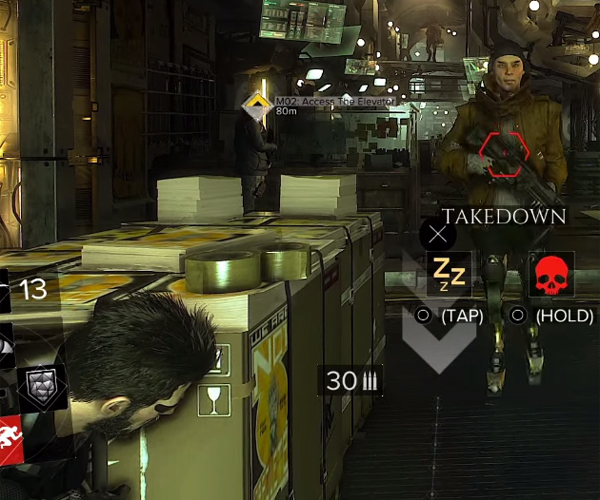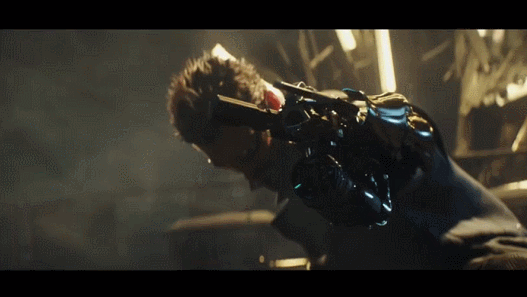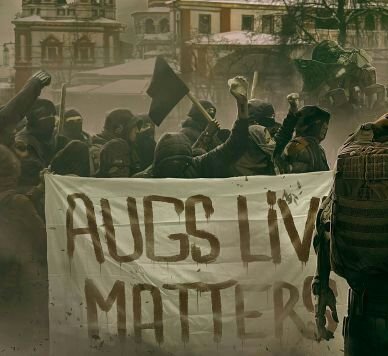(SPOILERS)
So I decided out of the blue to go back and replay Deus Ex: Mankind Divided. I finished my replay today and I have some thoughts.

First, the good. The main aspect that drew me back into playing Mankind Divided was it's gameplay, that classic mix of area traversal, stealth, gunplay, hacking, and speech conversations. It's incredibly rewarding to explore every different approach to any given situation and have it be valid. Want to hack your way through every door and security system? Want to non-lethally stealth your way through, undetected? Want to shoot em up and leave a pile of bodies in your wake? Something else? Typically whatever level you're in there's at least 2 or 3 ways to get through it with whatever your preferred method of play is. It wasn't uncommon for me during my return trip through the main story to come across paths and secrets that I had no idea existed the first time I played. I tend to reload saves constantly in games like these, testing every option presented to me, challenging myself to tackle an encounter differently than I did last time.

The new gameplay additions are a joy to play with, even if they throw off the delicate balance of "Everything is different but viable in its own way" that existed in Human Revolution. The TESLA augment sorta invalidates the Multi-Takedown, since it doesn't eat up energy, can be used at a distance, and can take down up to 4 people spaced apart instead of only 2 people standing right next to each other. The new multitools likewise kind of undercut all the hacking augments given how anything, no matter what security it might have, can be hacked by holding down a button. Overall, the gameplay is Human Revolution's plus more, which is the thing that drew me back in the first place.
Unfortunately, the game's story and characters are a marked step down from Human Revolution. We're introduced to a whole new setting, with new characters filling in the roles left behind; Instead of David Sarif as "The Boss" character we have Jim Miller, instead of Frank Pritchard as "The Jerk Friend" we have Duncan Macready, and so forth. The problem is, these characters aren't given nearly enough screentime to develop the way their counterparts were in Human Revolution. The only times we interact with Macready are in the first and last mission, and every scene with Miller is just him giving Jensen his next assignment, and the same can be said of almost every character in the game; we either barely ever meet them, or they do the same thing over and over with no real development.
No one gets it worse than the games nominal antagonist, Viktor Marchenko. He's a big, uninteresting brute whose only a stooge for Page and the Illuminati who you run into a grand total of 3 times, including your final encounter with him at the very end of the game. While the bosses of Human Revolution weren't much better, they were at least given proper introductions and send offs to make them seem intimidating, and Hugh Darrow was a great twist-villain who was somewhat sympathetic in his goals and motivations. Viktor Marchenko is an angry Ukrainian guy trying to do bad things because the real bad guys told him to.

The main story doesn't fair much better, as it feels like a truncated part of something larger. We start the game with an entirely new status quo, with no time to get a feel for how things have changed in the past two years outside of a phone call from Sarif. We spend most of the game in one location (Prague), whereas previous games had a much more vibrant, globetrotting feel to them, and the mystery/final confrontation falls flat when there are other, more pressing and interesting matters waiting to be resolved, like Janus, the Illuminati, Jensen's Mystery Augs/Clone theory, etc. Human Revolution ended on a world-altering event and decision, while Mankind Divided feels like an unsatisfying cliffhanger to the original Deus Ex.
Of course, you can't talk about Mankind Divided without mentioning its politics

Let's not beat around the bush here; Mankind Divided's heavy-handed apartheid/racism metaphor just doesn't work. While it does do some interesting things to get its point across, like having semi-random unskippable cutscenes of police officers checking your papers, or store clerks refusing to do business with you (even though it's okay, all the actually important stores are more than happy to do business with you) it ultimately feels unearned and exploitative. It never feels like Adam Jensen, one of the most heavily augmented human beings on the planet, is actually a victim of this discrimination that's supposed to be everywhere. He doesn't have to deal with unwarranted police brutality because his papers are always in check, you can still go pretty much anywhere you want, and there aren't any longstanding consequences for actively trying to fight the oppression you're seeing. But then again, why would there be? Why would you want anything frustrating like that in your power fantasy of one man versus the Illuminati? Just have the social commentary serve as window dressing for the fun stuff, it's not like the two will tonally clash at all!
It also leads to, in retrospect, same really head-shaking "both sides" moments, where Adam can just as easily pin the blame on ARC (the Civil Rights/Black Panther/BLM analogue) as he can on the police state. Oh, and did I mention that the plot revolves around augmented people being planted inside of ARC by the powers that be to ferment extremism and terrorism to stir up people's hatred of augmented people, and that you hardly spend any time actually trying to combat the corruption and systemic violence that is the root of the problem? *Sigh*
All in all, I still really enjoyed my revisit with Mankind Divided, even if more of the character/story/political problems were more apparent this time around. The gameplay is still rock solid, and I can't deny the fun I had exploring this cyberpunk dystopia one more time.

So I decided out of the blue to go back and replay Deus Ex: Mankind Divided. I finished my replay today and I have some thoughts.

First, the good. The main aspect that drew me back into playing Mankind Divided was it's gameplay, that classic mix of area traversal, stealth, gunplay, hacking, and speech conversations. It's incredibly rewarding to explore every different approach to any given situation and have it be valid. Want to hack your way through every door and security system? Want to non-lethally stealth your way through, undetected? Want to shoot em up and leave a pile of bodies in your wake? Something else? Typically whatever level you're in there's at least 2 or 3 ways to get through it with whatever your preferred method of play is. It wasn't uncommon for me during my return trip through the main story to come across paths and secrets that I had no idea existed the first time I played. I tend to reload saves constantly in games like these, testing every option presented to me, challenging myself to tackle an encounter differently than I did last time.

The new gameplay additions are a joy to play with, even if they throw off the delicate balance of "Everything is different but viable in its own way" that existed in Human Revolution. The TESLA augment sorta invalidates the Multi-Takedown, since it doesn't eat up energy, can be used at a distance, and can take down up to 4 people spaced apart instead of only 2 people standing right next to each other. The new multitools likewise kind of undercut all the hacking augments given how anything, no matter what security it might have, can be hacked by holding down a button. Overall, the gameplay is Human Revolution's plus more, which is the thing that drew me back in the first place.
Unfortunately, the game's story and characters are a marked step down from Human Revolution. We're introduced to a whole new setting, with new characters filling in the roles left behind; Instead of David Sarif as "The Boss" character we have Jim Miller, instead of Frank Pritchard as "The Jerk Friend" we have Duncan Macready, and so forth. The problem is, these characters aren't given nearly enough screentime to develop the way their counterparts were in Human Revolution. The only times we interact with Macready are in the first and last mission, and every scene with Miller is just him giving Jensen his next assignment, and the same can be said of almost every character in the game; we either barely ever meet them, or they do the same thing over and over with no real development.
No one gets it worse than the games nominal antagonist, Viktor Marchenko. He's a big, uninteresting brute whose only a stooge for Page and the Illuminati who you run into a grand total of 3 times, including your final encounter with him at the very end of the game. While the bosses of Human Revolution weren't much better, they were at least given proper introductions and send offs to make them seem intimidating, and Hugh Darrow was a great twist-villain who was somewhat sympathetic in his goals and motivations. Viktor Marchenko is an angry Ukrainian guy trying to do bad things because the real bad guys told him to.

The main story doesn't fair much better, as it feels like a truncated part of something larger. We start the game with an entirely new status quo, with no time to get a feel for how things have changed in the past two years outside of a phone call from Sarif. We spend most of the game in one location (Prague), whereas previous games had a much more vibrant, globetrotting feel to them, and the mystery/final confrontation falls flat when there are other, more pressing and interesting matters waiting to be resolved, like Janus, the Illuminati, Jensen's Mystery Augs/Clone theory, etc. Human Revolution ended on a world-altering event and decision, while Mankind Divided feels like an unsatisfying cliffhanger to the original Deus Ex.
Of course, you can't talk about Mankind Divided without mentioning its politics

Let's not beat around the bush here; Mankind Divided's heavy-handed apartheid/racism metaphor just doesn't work. While it does do some interesting things to get its point across, like having semi-random unskippable cutscenes of police officers checking your papers, or store clerks refusing to do business with you (even though it's okay, all the actually important stores are more than happy to do business with you) it ultimately feels unearned and exploitative. It never feels like Adam Jensen, one of the most heavily augmented human beings on the planet, is actually a victim of this discrimination that's supposed to be everywhere. He doesn't have to deal with unwarranted police brutality because his papers are always in check, you can still go pretty much anywhere you want, and there aren't any longstanding consequences for actively trying to fight the oppression you're seeing. But then again, why would there be? Why would you want anything frustrating like that in your power fantasy of one man versus the Illuminati? Just have the social commentary serve as window dressing for the fun stuff, it's not like the two will tonally clash at all!
It also leads to, in retrospect, same really head-shaking "both sides" moments, where Adam can just as easily pin the blame on ARC (the Civil Rights/Black Panther/BLM analogue) as he can on the police state. Oh, and did I mention that the plot revolves around augmented people being planted inside of ARC by the powers that be to ferment extremism and terrorism to stir up people's hatred of augmented people, and that you hardly spend any time actually trying to combat the corruption and systemic violence that is the root of the problem? *Sigh*
All in all, I still really enjoyed my revisit with Mankind Divided, even if more of the character/story/political problems were more apparent this time around. The gameplay is still rock solid, and I can't deny the fun I had exploring this cyberpunk dystopia one more time.


